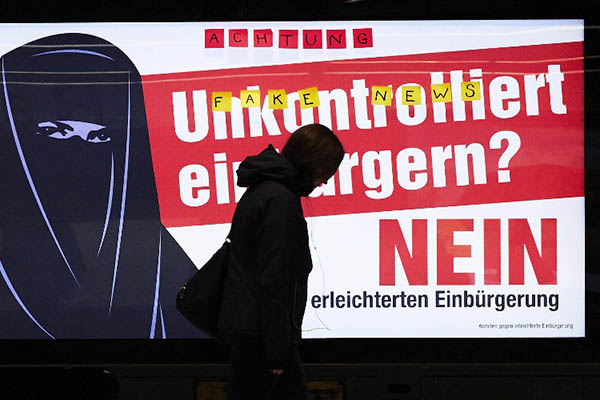
Michael Buholzer—AFP
Campaign featuring niqab-wearing woman warns citizens against voting for expedited citizenship measure.
The woman’s shadowed eyes stare out from a black niqab with the poster’s tagline urging Swiss voters to reject “uncontrolled naturalization.” But critics of the campaign image distributed across the country ahead of Sunday’s referendum say the poster is really just a brazen appeal to those worried about more Muslims becoming Swiss.
“That is exactly what they are trying to [do],” said Pius Walker, who heads the Zurich-based advertising agency Walker AG. “It is a very, very frightening thing that is going on here.”
The issue in Sunday’s vote, the latest in Switzerland’s direct democracy system, is whether the grandchildren of immigrants should be able to benefit from an expedited citizenship process. The government as well a majority of lawmakers and political parties support the proposal. They argue that children born in Switzerland, who have a grandparent who was also born in the country or had a residency card, should be able to skip a few steps in the arduous process of securing a Swiss passport.
According to a migration department study, an estimated 25,000 people currently qualify as third generation immigrants, nearly 60 percent of whom are Italian. But in campaigning against the measure, the rightwing nationalist Swiss People’s Party (SVP) has made clear that Italians were not its primary concern.
“In one or two generations, who will these third generation foreigners be?” SVP lawmaker Jean-Luc Addor wrote in an opinion piece on the party’s website. “They will be born of the Arab Spring, they will be from sub-Saharan Africa, the Horn of Africa, Syria or Afghanistan,” he warned.
The SVP is not officially responsible for the niqab poster. It was commissioned by the Committee Against Facilitated Citizenship, which is backed by many senior SVP members, including Addor, the committee’s co-chair. And SVP members are no strangers to campaigns denounced as discriminatory, notably a successful 2009 initiative to outlaw the construction of new mosque minarets.
Campaigns demonizing Muslims are expected from the SVP, but they are not “deemed acceptable” by the Swiss political mainstream, said Sophie Guignard of the Institute of Political Science at the University of Bern.
For most politicians and journalists, the niqab poster amounts to “a violent attack against Muslims,” Guignard told AFP. But that does not mean it won’t work.
The latest polls from the gfs.bern institute show 66 percent of people support easier citizenship for third-generation immigrants, with 31 percent against and three percent undecided. Polls from the news company Tamedia have it closer, with 55 percent in favor and 44 percent against. The “No” side has however gained about 10 points since polling opened. And an upset can’t be ruled out, especially with the touchstone issue of Swiss identity and Islam at the center of the debate.
The niqab poster was created by the Zurich-based agency Goal AG, whose chief Alexander Segert was described by the Financial Times in December as “the advertising guru of Europe’s new right.”
Segert has worked extensively for SVP members as well as the far-right Freedom Party of Austria and is seeking to expand his business to include Germany’s political right, according to the FT.
Among Segert’s earlier Swiss work was the 2009 minaret ban campaign. He produced a poster with a series of minarets sketched to look like spears protruding from a Swiss flag as a similar niqab-clad woman stared out in the foreground.
For Walker, whose agency has worked for leftwing causes and parties, Goal’s religiously and ethnically charged ads have “basically copied a style” that goes back to the “Soviet Union and Nazi Germany.”
“It’s a very simple trick,” where a nation’s problems are condensed into the image of a supposedly threatening outsider, he explained. He also expressed regret over the fact that rightwing parties seemed better at using such simple methods than the left.
“Maybe fear is very simple to communicate and hope and pluralism is harder,” Walker told AFP. “But that doesn’t mean it shouldn’t be done.”
